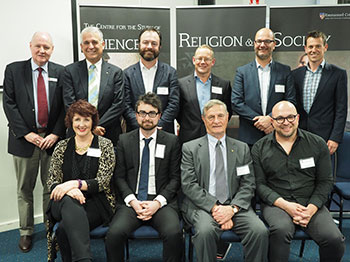
Front row (l to r): Fiona Simpson MP, Dr Joel Harrison, Hon John Murray Sanderson AC, Dr Scott Stephens
The Faith in Public Office conference held on Thursday 3 September explored the complex relationship between an individual’s religious convictions and the carrying out of duties in public office. The conference was co-sponsored by the Centre for the Study of Science, Religion and Society at Emmanuel College and the TC Beirne School of Law, The University of Queensland. Several people who have previously held high public office reflected on their own understanding this relationship. Former Deputy Prime Minister John Anderson appealed to the extraordinary social advancements secured by Wilberforce and Shaftsbury during their parliamentary careers to justify why faith should not be left at the cabinet door. The Hon John Murray Sanderson AC, former Governor of Western Australia and Chief of the Australian Army, spoke about the personal and ethical challenges encountered by a person of conviction who holds high public office. Michael Cooney, a former speech-writer for Prime Minister Julia Gillard, focused on the question of retaining personal integrity while having a partisan commitment to the cause of a particular political party. Fiona Simpson MP, former Speaker of the Queensland Parliament discussed the important role played by the Speaker in ensuring the Parliament is a place of open deliberation and robust debate.
A number of academics also contributed papers. The University of Queensland’s Professor Nicholas Aroney investigated the nature and grounds of faith in public office by attending to the practice of oath-taking in political office. Dr Scott Stephens (ABC Religion and Ethics commentator) gave a stirring address on the state of political debate and ‘public opinion’ in Australia today. Dr Joel Harrison (Macquarie University) critically analysed the idea of political liberalism that public policy must be based on principles that all people can share whether they have religious faith or not.
A book based on the conference papers is being planned.



